Chris Baty's Blog, page 105
March 26, 2018
What Will Your Camp Creation Be?
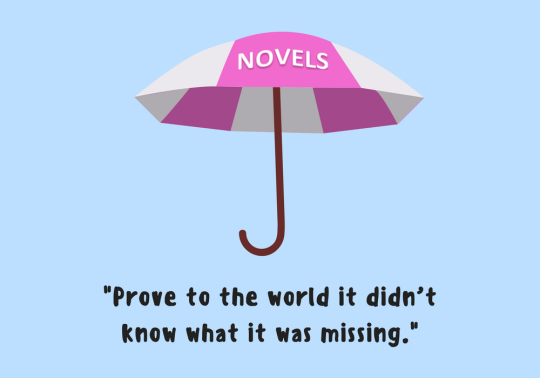
We’re gearing up for Camp NaNoWriMo, and we’ve asked our great community for their advice for campers, both new and returning. Today, YWP writer Claire Marino shares what makes Camp NaNo so special:
Imagine being locked in a room for a month. You’re told to set a goal for yourself, keep track of your progress, and create something you care about. You have complete creative freedom—something that, these days, is much harder to come by than you might think.
So, what is this mighty project? What do you immediately itch to write when given such a guideline? Take that inkling—that feeling—and bottle it up! You will need that inspiration later!
You might be thinking, “NaNoWriMo? Isn’t that the insane novel-in-November thing? I can’t do that. I don’t even want to write a novel, anyway.” To which I would say, “Great! Then Camp NaNoWriMo is just the thing for you!”
There is one main difference between Camp NaNo and November NaNo: creative freedom. In Camp NaNo, not only can you write whatever you want, but you can also track your progress however you want. You can track your project progress through words, lines, pages, or hours spent working on the project. The only measurement I could even think of to add to the list would be seconds spent thinking about the project. (Boy, wouldn’t it be great if they counted?)
Just think of all the wonderfully YOU things you could write with such progress-tracking freedom. In case you’re awestruck just thinking of all the possible things you could write, I’ve curated a list. From the conventional to the unique, there are truly no bad options with what you could write. You could write a…
NovelNovel outline and/or other pre-writing processes
Novella
Screenplay
Video game scriptShort story or collection of short stories
Poem (an epic, a few poems, or a whole collection)
Board game
Zine
Memoir
Letter collection
Essay or essay collection
Dictionary in the fantasy language you’re creating
Recipe, or a whole cookbook
Comic book
Response to a different word prompt each day
Anything else you can imagine!
With Camp NaNoWriMo, not even the sky is the limit—you are encouraged to surpass it.
I could probably write a novel itself about the endless possibilities Camp NaNoWriMo provides. In fact, I did, and I won last April. (Just kidding…I lost.)
It’s important to sit down and really think about what you want to create this month. Camp NaNoWriMo was created for people like you to create the things that matter to you—things that don’t necessarily fall under the “novel” umbrella.
Don’t let the opportunity pass you by to learn something about yourself and write something you care about in the process. Or, you know, write a dictionary chock full of the words your dog knows how to say. Whatever inspires you. This is your time to take advantage of creative freedom and set a goal. Prove to yourself that you can. Prove to the world it didn’t know what it was missing.

Claire Marino is a high school sophomore from New Jersey who has been creating stories since before she could read. She spends her free time reading anything she can get her hands on, singing under every breath, and writing everything from novels to poetry to music. Some of her favorite authors and greatest literary inspirations include Jandy Nelson, Marissa Meyer, L. M. Montgomery, and J. K. Rowling. Two recurring themes in her work about which her family loves to tease her include deceased fathers and the moon.
March 23, 2018
The Real Meaning of Camp NaNoWriMo

We’re fast approaching the start of Camp NaNo, so we’ve asked the community for their stories and advice for campers, new and returning. Today, YWP writer Arianna Smith shares how she learned what Camp NaNo is all about, and what makes it different than November:
I’m going to be completely honest. Camp NaNo and I don’t have the best history. Though the characters, settings, and scenes of my stories changed over the years, the ending of failure always seemed to stay the same. It was frustrating to say the least—especially since I’d proven myself capable of tackling such a challenge in previous Novembers.
It didn’t matter how thoroughly I packed my backpack, how much I loved my cabin mates, or how excited I was about starting this new project. 50,000 was always out of reach. If my Camp NaNo word count breached a mere 10,000, it was a cause for celebration.
So one fateful July, I tried that goal on for size. 10,000 words didn’t feel like enough to me. My eventual win would feel cheap—as if I’d cheated the system somehow. It wasn’t until the next March rolled around and I was struggling to envision my new idea that I realized just how utterly wrong my feelings about Camp NaNo were.
It suddenly dawned on me that Camp NaNo isn’t NaNoWriMo. It’s not supposed to be, and their differences are where Camp NaNo’s beauties lie.
All this time, I’d faulted Camp NaNo for not embodying the same frenzied excitement of November, and it was my own mindset that was holding me back.
Camp NaNo embodies freedom. I’d never considered not writing a brand new novel for Camp NaNo before, but who was to say that I couldn’t revisit one of those unfinished stories crying out on my hard drive? Or give scriptwriting a try? Or maybe even explore the art of short stories? The possibilities soon became endless in my mind.
“It’s about setting a personal goal for yourself, having fun with your writing, and walking away happy no matter the month’s outcome.”Camp NaNo is the freedom to choose your own word count. November is for pushing your capabilities; Camp is for doing what you know you can handle. There’s no shame in whatever goal you set, and no number is merely this or merely that. No time spent in creativity can be “just merely” anything. There’s even the freedom to choose how you count your success—whether it’s in words, time, or pages! It was about time I seized Camp NaNo for all it was offering. I decided to give revision a try, returning to the shores of a long neglected novel.
And even though I didn’t win by meeting my goal last year, I won in that I actually truly enjoyed my Camp NaNo experience for the first time in five tries. Thanks to great writing buddies, it was bound to be a session to remember—and that’s what Camp NaNo is really all about. It’s not earning that the giant ribbon or those winner goodies. It’s about setting a personal goal for yourself, having fun with your writing, and walking away happy no matter the month’s outcome.
So to all my fellow campers out there, keep on accepting the challenge that is Camp NaNo. Keep on making it your own. Keep on exploring those worlds stored in your brain. If you’re not enjoying your Camp NaNo experience, I encourage you to switch it up for a session. If you normally plot, give spontaneity a try. If you normally write by the seat of your pants, take your Camp NaNo time to learn how to plan. Find some new cabin mates and writing buddies to take on this adventure with. You just might be surprised with what you find.

Arianna Smith is a graduating high school student, a writer of all genres, and an active member of the YWP community. A five-time NaNoWriMo survivor and four-time winner, this is her fourth year as a Camp NaNo participant. Some of her favorite books include George Orwell’s 1984, Gail Honeyman’s Eleanor Oliphant is Completely Fine, and Jenny Han’s The Summer I Turned Pretty and To All the Boys I’ve Loved Before trilogies.
Top image licensed under Creative Commons from Justyn on Flickr.
March 21, 2018
For the Honor of Tippy! How to Host a Regional Competition
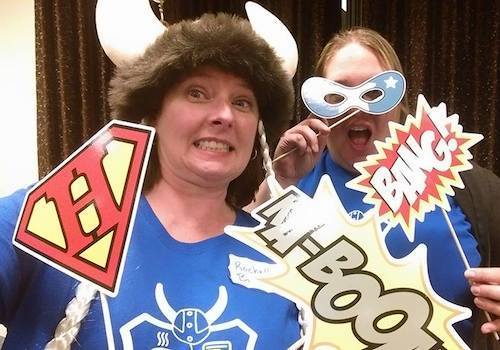
Every year, NaNoWriMo’s super cool Municipal Liaisons find ways to make writing even more fun. Today, Dayton, Ohio, ML Rochelle Bradley tells us about the November challenge that her region started with the neighboring Indianapolis region. (Want to create a fun regional challenge this year? Join a region and start chatting with fellow participants and MLs!)
For NaNoWriMo 2017, the Dayton, Ohio region declared war on Indianapolis, Indiana. Both regions have awesome Municipal Liaisons ☺, Wrimos, and mascots. Dayton has a cute three-legged cat named Tippy, an actual pet of a former ML. Indy’s mascot is Moe the tomato.
The regional MLs decided on the winning criteria. The losing region had to write a poem in the opposing mascot’s honor. We posted the “call to war” in Indy’s forum:
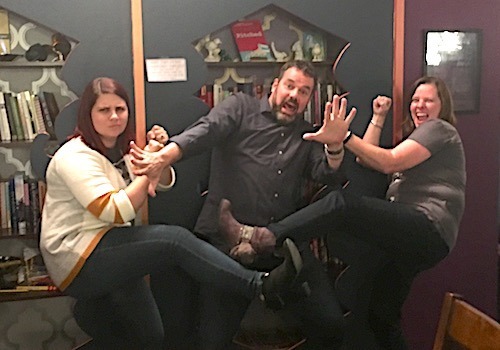
Hark!
We the Wrimos of the Dayton, Ohio Region challenge thee to a duel! For Tippy the three-legged cat’s honor, we shall raise our pens and open our laptops to take the battle to the pages of our novels. Our region may be small but we are fierce.
The duels shall three be:
Average word count per Wrimo
Average donation per Wrimo
Percentage of winners per region
The battle of wits and words will commence forthwith on the first of the eleventh month and ending on thirtieth day at the stroke of midnight.
Prepare thyself for battle! Tippy is hungry for marinara sauce.
Indy replied in kind:
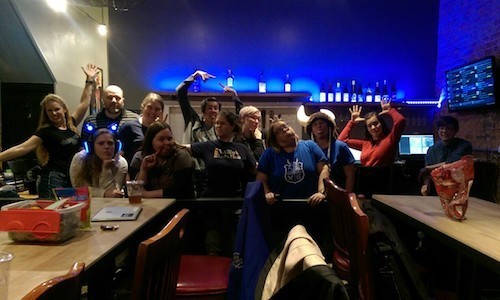
The bold Indianapolis Wrimos challenge the entire region of Dayton to a WAR! There will be blood, there will be screaming, there will be… probably lots of writing and money donated, let’s be honest.
The realms of combat shall be as follows:
Average word count per Wrimo
Average donation per Wrimo
Percentage of winners per regionLet the battles commence! Well, starting on November 1, and ending on the 31st at midnight, as specified in the lore of old. Indianapolis WILL be victorious! By the end, a tub of tomatoes will be toppled on Tippy. Bring it, Dayton!
ML Strych and I loved working with Indianapolis’ MLs, Chelleybean13 and Cgarrett. We all were motivated to inspire and encourage our Wrimos. From the Hogwarts House Cup challenge, weekly Write-Ins, and even meeting mid-way in Richmond, IN for a cross-region write-in, we worked to prod the words out of our regions. What greater motivation do you need than a fuzzy three-legged kitty?
Who won the challenge? Indianapolis. This time.
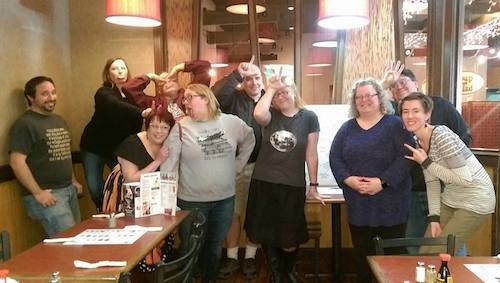
Here is the ode the Dayton Wrimos wrote at the TGIO (Thank Goodness It’s Over) party:
Moe’s Ode (AKA Tippy’s Lament)
To Indianapolis and rotten tomato Moe,
a lament from Tippy and Dayton, OH.Tomato! Beauteous, Moe! Delish in marinara,
freshly chopped in salad, red as Scarlett O’Hara.Poor Tippy, we tried,
how sad to see your tomato-covered hide.O Glorious orb, ripe, red, and round,
emerging from the sun to pound us to the ground.“Tippia volt!” we cried and charged into the fray.
How odious that a vegetable/fruit should carry the day,
while Tippy the kitty lazed away.Indy’s writing game was mean,
whether Moe was fresh and red or crispy, fried and green.And we must admit, the tomato, however green or soft or flavorless,
will always cook up better than a cat—a tasteless cat.So keep on rolling, oh great round fruit,
while Tippy tries to right (write) herself.
Even though Dayton didn’t come out on top, we collectively wrote 8,438,171 words. That’s eight million words! Crazy awesome!
New friends, more words, collaborative poem writing…we all won. There’s nothing like the competition of a regional NaNoWriMo war to motivate DayOhWrimos to write for the honor of Tippy.
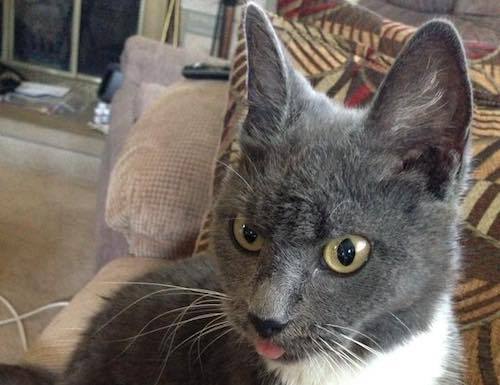
In autumn of 2008, Rochelle Bradley wrote her first romance novel. Midway through, Hurricane Ike (yes, a hurricane in Ohio) rendered her laptop useless with a nine-day power outage. She didn’t give up, but continued to pursue her dream. Introduced to NaNoWriMo in 2008, she became hooked and has won every year since. In 2015 she became a Municipal Liaison for the Dayton, Ohio region. Her 2013 NaNoWriMo novel The Double D Ranch was published in December 2017. Rochelle shares her home with one cat, three lizards, two high schoolers, and her Prince.
March 19, 2018
3 Reasons to Love Camp (Even More than NaNoWriMo!)

We’re gearing up for Camp NaNo, so we’ve asked some of our community members to share what they love about Camp! Today, writer Athena Franco tells us what makes Camp great, and why she might love it even more than NaNo:
It’s a bold statement, but it’s true. There’s nothing like the experience of NaNoWriMo—the rush, the thrills; the howls of frustration and the tears of joy. Why, then, do I find myself so elated when Camp rolls around? Isn’t it just more of the same? It doesn’t have to be, and therein lies the beauty!
Here are three reasons I love Camp…maybe even more than I love NaNoWriMo.
1. ExplorationWhat projects have you always wanted to explore? What ideas lurk in the corners of your mind? What deep wellsprings of creativity have you left uncharted? What’s that collection of lyrics singing in your soul, the spark of a script keeping you awake at night?
For Camp, I’ll be deep diving the murky waters of revisions—a stage of the writing process I enjoy yet never seem to have time for. Well, here’s my chance! Perhaps you’ve always wanted to try a complex outlining system or you have a blank sketchbook just begging to be turned into a graphic novel. Maybe you’re a steadfast outliner who secretly harbors a desire to pants your way through an entire novel. Now’s the time to finally feed your creative cravings.
2. FlexibilityLike a great video game, Camp allows you to set your own level of difficulty in the form of a custom goal. The keyword here is customization, not comparison. It’s all about crafting at your own pace. Keep it slow and steady, picking your way along unstable ground, or plunge recklessly headlong into the dark woods.
For example, I struggle with word counts; so, in April, I’ll be tallying my victories in minutes and using a nifty little timer to help me keep track. This is a great time to add a writing achievement to your scorecard, no matter how big or small. You choose the goal, so take advantage of that and set yourself up for success!
3. Good VibesFrom constructing blanket forts to debating the best degree of toasted marshmallow doneness, at Camp, things are just way more chill. I can easily keep up with the forums and find it easier to strike up conversations with a cabin mate. There’s way less FOMO, and I don’t feel guilty about updating my achievements at the end of the day as opposed to every ten seconds.
Instead, I can relax and just enjoy the process. Real camping is about escaping the everyday—your classes, work, and laundry will all be waiting for you when you get back, so for now, sip some lemonade, stretch out on the grass, and let your muse frolic with abandon.
As a bonus, maybe you never went to “real” camp—just band camp, where you got a weird sock tan and attacked by swarms of dragonflies. (Speaking from personal experience here!) Anyway, this may be as close to real camping as you’ll get, so go all out!
If, like me, you want to set your own pace and experiment creatively, Camp is the place for you! If NaNoWriMo is the stormy sea, then make Camp your quiet creek of scripts or your raging river of revisions. It can be an avalanche of short stories or a gentle rhythm of poetry rain.
Shape your path and rest assured, you’re not alone. It’s a wide wilderness, but we’re all wandering it together.

Athena Franco is a writer and professional daydreamer obsessed with all things creativity. With a bachelor’s in psychology, a master’s in public health, and an eclectic career history, she spends her free time playing video games, lurking at the library, and watching her houseplants slowly die. She currently resides in Virginia with her Navy sailor husband and a growing stash of pens that don’t work. Find her on Youtube, Instagram, and Twitter.
March 16, 2018
The Camper’s Library: 8 Books to Help You Meet Writing Goals

We’re gearing up for Camp NaNo, so we’re asking the community to share their Camp experiences and tips. Today, writer and editor Katta Hules shares a few books that have helped her become a better writer:
I’m a lifelong bookworm. Whenever I start a new project, or just need a boost in writing an old one, I always like having a reliable selection of books to turn to. Camp NaNo is no different. Some books are specialized for certain types of storytelling, but can be applied across mediums. Here are some books that have helped me in my writing journey so far, and will hopefully help you!
Pre-WritingThese books are helpful for prewriting and outlining for plotters; or, if you’re a pantser, for internalizing a basic story structure.
Save The Cat! The Last Book on Screenwriting You’ll Ever Need by Blake Snyder: A classic for breaking down plot structure and story beats. It tends strongly towards a commercial bent, but Snyder’s concepts are clear and solid.
Backwards and Forwards: A Technical Manual for Reading Plays by David Allen Ball: A short handbook that gives the reader a clear understanding of what drives the plot, how to convey it successfully, and gives examples to illustrate each idea concretely.
Tips & TricksI love a good tips and tricks guide! These two are fun, informative, and can be dipped in and out of for inspiration.
The Kick-Ass Writer: 1001 Ways to Write Great Fiction, Get Published, and Earn Your Audience by Chuck Wendig: Wendig doesn’t pull his punches or censor his language. Among the many, many tips in this book, you’ll find really creative swearing, odd and somewhat gross imagery, and funny but sound advice.
Steal Like An Artist: 10 Things Nobody Told You About Being Creative by Austin Kleon: This fantastic illustrated book on creativity is one of my favorite books of all time. It’s full of quotes, advice and common sense ideas that blew my teenage mind when I first picked it up. I recommend it to all my creative friends, and by that I mean I press it into their hands whether they want it or not.
Pick-Me-UpsWe all get blocked sometimes and it sucks. Here are a couple books I like to dip into when the going gets rough.
Chicken Soup for the Writer’s Soul: Stories to Open the Heart and Rekindle the Spirit of Writers by Bud Gardner, Jack Canfield, and Mark Victor Hansen: A collection of essays from writers about all stages of the writer’s life. The essays are short but comforting all the same.
Quotes for Nasty Women: Empowering Wisdom from Women Who Break the Rules Ed. by Linda Picone: The quotes in this book make me happy both as a woman and as a creative person. Every page has an empowering quote from a woman who went out and did something amazing, even though it was hard. An especially good read for Women’s History Month!
Staying in the HabitThese are great for keeping up your word count during Camp and keeping your momentum going afterward — remember, the end of April doesn’t mean the end of your project!
Deep Work: Rules for Focused Success in a Distracted World by Cal Newport: One of the best ‘work smarter, not harder’ books I’ve read lately. Newport emphasizes focused sessions set aside for work, which allow you to enjoy the rest of your day. He makes good points about connectivity and productivity, but his methods may not be for everyone.
On Writing: A Memoir of the Craft by Stephen King: King’s memoir is a classic for a good reason. It’s a well-written, compelling page-turner full of tough love advice and a glimpse into the life of one of the most successful writers out there.
There are many more wonderful craft books out there. I hope this list helps you find books that inspire and help you along your writing path!

Katta Hules is a writer and an editor at TUBE. Magazine and author of The Bookworm Is In newsletter. Her fiction has appeared in several publications including Fantasia Divinity, Visual Verse, 200 CCs, and the Realities Perceived anthology from Left Hand Publishers. She has also written several Twitter-based serials for the new story app Everyst. She can be found lurking around Twitter, Facebook, and her website.
Top image licensed under Creative Commons from Nathan O’Nions on Flickr.
March 14, 2018
3 Writing Distractions and How You Can Stop Them
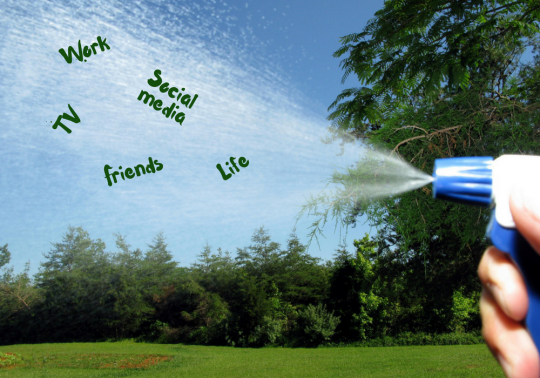
We’re gearing up for Camp NaNo, so we’ve asked the community for their best advice for new and returning Campers. Today, writer Sarayu Adeni shares three distracting writing “mosquitoes” and how to defeat them:
I confess, the title is a bit deceptive. You can’t actually stop distractions from draining your time and motivation from you while you’re writing. Like writing mosquitoes, they’re aggressive little beasts.
Meet the three distraction “mosquitoes” whining around my (and possibly your) ears at Camp NaNo this year:
1. WorkThat is to say, actual work, or grad school work, or undergrad school work, or homework. I’ve lived, studied, and worked on three different continents during past Camp NaNos, and despite valiant efforts, I’ve sometimes rejected my super-novel’s attempts to fly and gone back to my meek alter-ego’s everyday grind. This year, I’m balancing Camp NaNo with a job hunt—so this mosquito bites hard. The resume polishing, cover letter creation, networking, interviewing, etc. are top priority!
2. Love and/or HeartbreakYou may be in that fresh, sparkly initial stage of any new relationship, or—like me—you’re pushing heavily past a recent disappointment and moving on. These are raw, common experiences. But I find when I’m trying to write, they like to buzz in my head with daydreamy replays and alternate endings as if it’s never happened to anyone before. Which of course, as far as word count goes, is completely unproductive. Swat that mosquito!
3. Living SpaceI recently moved into what Virginia Woolf referred to as “a room of one’s own,” which means I have space and solitude and every reason to hit my Camp NaNo goal this time…right?
…Except I have to take out the trash tomorrow, don’t forget! And that’s the third lightbulb that’s gone out this month—better get that checked. It’s almost seven p.m., go feed the dog! When was the last time I watered that potted succulent? …I think it’s time to break out the vacuum cleaner.
How to deal with these distractions:There’s no amount of bug spray that will get rid of these distractions for good when I’m trying to write. So here’s my approach at Camp NaNo this year: instead of trying to oust the mosquitoes from my tent, I’ll invite them in.
I’m resurrecting a long-unfinished NaNoWriMo novel that I’ve been working on in Camp NaNo the past two years. By looking around my own house (distraction #3), I can add richer descriptions of surroundings and what tasks my characters are doing or need to do.
Maybe some of them are better than I am at balancing it all. In fact, do all my characters have stable jobs? If not, why not? Maybe I should see how they hold up in an interview. And maybe my own areas of expertise in international development, youth empowerment, and journalism can add something legitimate and complex to my made-up plot. In other words, make use of your own distractions to push your writing ahead.
As for the ups and downs of relationships, I don’t want to inflict heart-suffering on my characters—but I do want them to learn the same lessons I did, or at the very least teach me something. Maybe as I journey forward, they can keep me company. A long tirade from a jilted lover is good for word count, anyway.
Your whining mosquitoes—your distractions—at Camp NaNo this year might be the same as mine. Maybe they’re different. But don’t give up and let them consume you alive, or waste time trying to slap them away. Find a way to work them all in to the novel, poem, play, script, whatever. This year, turn whining into writing.

Sarayu Adeni lives in Austin, Texas, but in different eras of life, she’s called Chicago, Valparaíso, Kumasi, Playa Najayo, and New York City home. Amid her travels, she has participated in Camp NaNoWrimo since April 2013, ScriptFrenzy once, and NaNoWrimo for over eleven years. When not facing down the ol’ writer’s block, she works in the nonprofit sector, studies classical Indian dance, and holds the world record for slowest eater. Visit her on LinkedIn or on her website.
Top image modified from an image licensed under Creative Commons from frankieleon on Flickr.
March 12, 2018
NaNoWriMo’s Young Writers Program
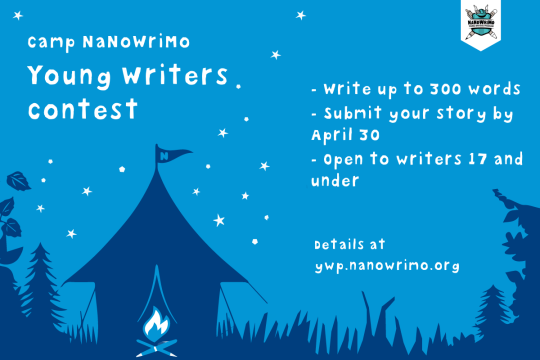
Enter the Camp NaNoWriMo Young Writers Program contest for a chance to win some prizes and get your writing published on the NaNoWriMo blog! (Open to YWP participants age 17 and younger. Click on the link for more details!)
March 9, 2018
5 “Key” Tips to Making Your Writing Authentic

We’re gearing up for Camp NaNo, and whether you’re a first time NaNo writer, or if you’ve published before now, you’re sure to know that there’s a lot of work involved in writing a book and making it feel authentic. Today, writer and Wrimo Jav Bond shares their tips for making your writing authentic:
The process of making a good novel great involves more than cleaning up small errors; it can mean taking on an intense process of starting from the ground up (sort of). So it’s important to remember throughout the entire process that authenticity is key.
Here are some key lessons I’ve learned from writing, editing, and preparing to publish my NaNo novel:
1. Revisit and rethink your novel.You probably already know what I’m about to say: when you’re planning to publish, you can’t just send in your draft as-is; you need to revisit and rethink your story with a fresh perspective.
The editing process isn’t just a grammar check; it’s a crash course in managing how your story flows—from the plot and characters to the style, you’ll have to grow in your overall understanding of the story.
2. Fix plot holes.In the course of editing four stories, I’ve found that flow is paramount. For example, you need to check for any plot holes. There might be a specific place a character visited that, later in the story, is said to be somewhere else. Someone may reference something that never happened, or call a character by the wrong name.
These things we call “plot holes” can be used to great effect—for instance, in a story about memory loss—but every story needs consistency. And that starts with you, going over your story with a fine-tooth comb. If your story goes to print, and it’s full of plot holes, your readers won’t understand where your characters are, or even what happened two pages ago. Your story might be powered by magic, but your readers’ logical acuity surely won’t.
3. Know where you are…When it comes to helping your readers follow the story without getting lost, you may find it helpful to describe the geography of your setting. That way, you have a location which you automatically connect with—that is, put a name to a place. I forget the geography sometimes, but it helps to draw a plan, map, or some specific locations in whatever place you choose.
You can also make an attachment or enter some geographical information as a footnote, so it looks like a real location. Both you and your readers may also enjoy some historical information on the people or places you’ve created. This can also come in the form of pictures, maps, and textual information. Remember: dimension is key!
4. …And know who your characters are.The same applies to your characters—their personalities, looks, hobbies, routines, and more. For instance, if I have a character named Will, it’s important that he has things he enjoys. What does he do in the rest of his life outside of the story? What does a typical day in Will’s life entail? How does he style his hair?
Details like these will help hook your readers, especially in the first few chapters. Once they’re drawn in, you can really accelerate your story’s action—so much so that you readers are shocked, but excited to go on.
5. Get feedback.It’s also essential that you get outside feedback. It’s hard to make a story feel authentic without people to verify that it is authentic. That means socializing with other writers, making friends, comparing your styles, and—most importantly—reading other works! So, be it through casual friends or professional beta readers, you should always try to get some critical feedback on your work. That way, you can pinpoint what needs improving, and really make your story sing!
Jav Bond is an author, blogger, YouTuber, Plotagon plotter, occasional singer, and reader of romance, suspense, and classics. Jav has written ILE, Dangerous, Lost Innocence, and Royally Murdered (Book One in the Stronglaw series).
Top image licensed under Creative Commons from Jessica Paterson (https://www.flickr.com/photos/modernrelics/) on Flickr.
March 7, 2018
Succeed with These S.M.A.R.T. Camp NaNo Goals

Camp NaNoWriMo is just around the corner! If you’re a first-time camper, welcome! If you’re a returning camper, welcome back! Everyone needs a clear set of writing goals in order to succeed; today, writer Marissa O’Leary shares a SMART tool for making your Camp adventure great:
Camp NaNo is all about choices: Will you participate in April or July (or both)? Will your goal be in pages or hours? Poetry or novel? Cabin or solo? It can be so hard to decide!
One thing I love about Camp NaNo is how much freedom you’ve got. All the power is in your hands: you decide what your project will be and what your writing target is for it. This can be both awesome and overwhelming. As you spend this month thinking about what you will write, consider some other aspects: how much writing you’re going to challenge yourself to do and why you’ll definitely be able to achieve this amazing feat.
An effective tool for focusing your writing goal is by creating “SMART” goals. “SMART” is an acronym that you may have heard of in school or in a work training program. Applying it to something you’re passionate about (like your writing, for instance) helps you learn this useful technique in a fun and memorable way. Here’s what “SMART” stands for and how you can apply each step to your writing:
SpecificFirst, your goal needs to be Specific. Luckily, the Camp Nano program makes this really easy for you. You know specifically what you want to do. You’re going to write a novel. Or a comic book. Or a collection of short stories! Even if you don’t exactly know all the details of who your characters will be, what they’re going to do, or what their conflicts are going to be, the fact that you are going to commit yourself to sitting down at your notebook, typewriter, voice recorder, or computer to craft a story is specific enough.
MeasurableNext, your goal needs to be Measurable. How much are you going to write? Are you going to spend two hours a day? Or write forty-thousand words? You can choose your target and adjust it as necessary. Then, you can chart your progress. I’m super competitive so there’s nothing I love more than seeing the little bars on my graph exceed that diagonal line!
AchievableIs it Achievable? Of course it is! However, if you’re starting to doubt yourself or need a little bit of emotional support, you can join a cabin of writers to chat with. I’ve really enjoyed my experiences with my cabin because I moved to a new country and didn’t always have many people to talk to. My cabin-mates were a virtual support group both for my move and for my writing.
RelevantFourth, your goal needs to be Relevant. You may wonder how writing a fantasy romance story between a rich baroness and a poor peasant farmer relates at all to your life in the real world. This is the time to remind yourself that pursuing your passion is always worthwhile and relevant to your life. Use this month to take an hour or so out of each day to craft your own mythical realm, torture an evil dictator (that may or may not resemble your boss at work), or help your hero to hatch a brilliantly executed heist.
TimelyLast, it needs to be timely—in other words, you need to follow your schedule. If you’re doing Camp in April you’ve got thirty days; in July, thirty-one. Having a time frame keeps you accountable to your deadlines and acts as a great finish line for you to victoriously pursue.
Put all together, you’re able to commit to the goal of writing that perfect project. You believe you can do it, you believe you should do it, and you’ve got a month to prove it! Good luck!

Marissa O’Leary is an aspiring writer from Florida. Her favorite color is purple; her favorite book is Slaughterhouse Five, and her favorite sport is soccer. When she’s procrastinating from writing she likes to knit while watching Netflix or listening to podcasts. She studied Chinese in college and has been living in Hong Kong for the past two years with her husband and her cat, Yuki, who you can follow on Instagram at @yuki_the_goblin.
March 5, 2018
6 Things to Pack in Your Camp NaNo Backpack

Camp NaNoWriMo season is upon us! As we gear up for another great season of camping, we’re asking the NaNo community about their best tips for a great month of writing. Today, writer Christina Bagni shares the six things you can’t do without in a month of Camp NaNo:
Hikers and writers have a lot in common. Some hikers can wake up on a Tuesday and decide to climb a mountain on the way home from work. Other hikers plan their excursions to a T, homemade trail mix included. However they prepare, all hikers have the same goal: to climb that mountain!
I like to be prepared when I hike; the same is true when I write. To help new campers out, I’ve compiled my packing list for the upcoming Camp NaNo adventure. You might pack your bag a little differently, but this is a great place to start:
#1: Fire StarterEvery hiker knows the importance of a lighter or some flint and steel. For a writer, your fire starter is your pen or your laptop. It might take a while to get your tinder blazing, but just keep working—eventually a spark of inspiration will catch!
#2: Sleeping BagCamp NaNo supplies cabins for you, but you’re responsible for your own sleeping bag: i.e., a comfy place to write. It might be your desk, or a library, or your porch. For me, my “sleeping bag” is my bed. That’s the difference between writers and hikers—writers can write in their pajamas.
#3: Emergency SuppliesWhen it comes to emergencies, hikers prepare in case they lose the trail—so they pack a poncho, first aid kit, and a flashlight. Writers prepare in case they lose their inspiration. In your writer’s backpack, bring a handful of writing prompts and NaNo pep talks. They might be just what you need to get back on track.
#4: SnacksThis is where hikers and writers are most alike. A bit of brain food (or a thermos of coffee) can do wonders for your will power. To really get in the spirit of things, you could even make your own trail mix. I like mine with double the recommended chocolate.
#5: Map & CompassSome hikers don’t need a map, but I always like to know I’m where I’m supposed to be. For Camp NaNo, I usually outline my entire project before I begin, so I know every twist and turn I have to take to reach that summit. Some people are planners, others pantsers—and still others “plantsers.” Which one are you?
#6: A Camp BuddyOkay, so you won’t actually carry your buddy in your backpack, but they’re still good to have with you. Buddies are great for motivation, or to bounce ideas off of—plus, nothing’s better than seeing each other succeed. Don’t have a buddy? That’s what cabins are for!
Whether your camp backpack is full to bursting or you forgo the bag altogether, happy hiking—and I’ll meet you at the top!

A BFA graduate of Emerson College, Christina Bagni has been writing novels since she was 12. She is currently editing her last NaNo-winning novel, while teaching ski lessons in the mountains of Vermont. Christina’s creative work has been published in Asterism, The Underground Literary Magazine, and Reading A Bit Magazine. Nonfiction work can be found in The Boston Globe and Emerson’s Pub Club Blog. Visit her online at https://christinabagni.wordpress.com/ and on Twitter @ChristinaBagni .
Top image licensed under Creative Commons from Kooikkari on Flickr.
Chris Baty's Blog
- Chris Baty's profile
- 63 followers



